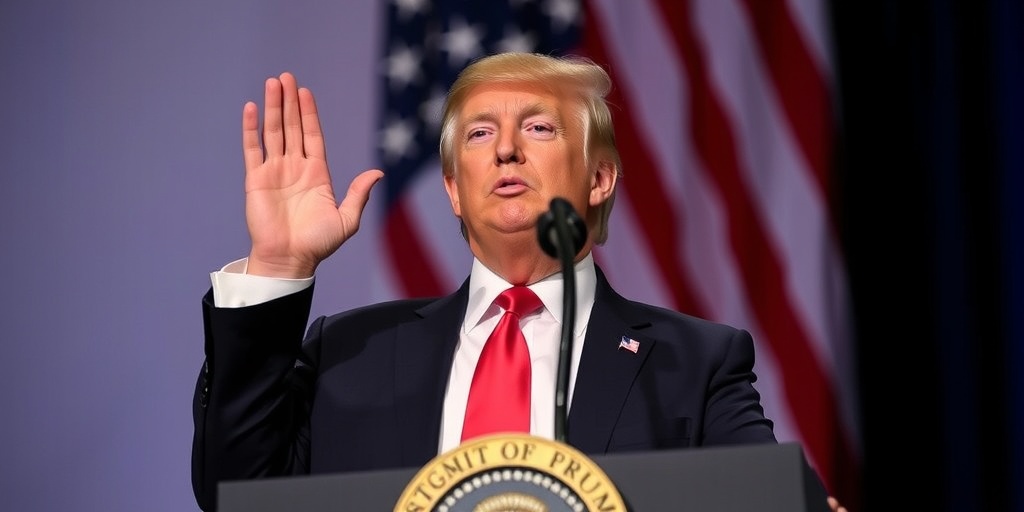Now Reading: Judge Blocks DOJ from Releasing Trump Documents Report
-
01
Judge Blocks DOJ from Releasing Trump Documents Report
Judge Blocks DOJ from Releasing Trump Documents Report

A federal judge in Florida has issued a ruling that prevents the Justice Department from sharing a potentially damaging section of a report related to former President Donald Trump’s handling of classified documents with Congress. The decision comes in light of a broader investigation conducted by former special counsel Jack Smith. The judge, Aileen M. Cannon, expressed significant concern in her 14-page order about the implications of sharing this sensitive information outside the Justice Department, particularly with lawmakers who might inadvertently reveal its contents to the public.
In her order, Judge Cannon highlighted the strong public interest in the ongoing criminal proceeding involving Trump, emphasizing that there could be a reasonable likelihood that opening the report to congressional members would lead to its public dissemination. She stated, “Given the very strong public interest in this criminal proceeding and the absence of any enforceable limits on the proposed disclosure, there is certainly a reasonable likelihood that review by members of Congress as proposed will result in public dissemination of all or part” of the report.
This ruling comes in the context of previous actions taken by Merrick B. Garland, the then-Attorney General, who had suggested that key leaders from both the House and Senate Judiciary Committees should be allowed access to the classified documents section of Smith’s two-volume report. Garland had already made the other volume of the report public, which dealt with a separate criminal investigation into Trump’s alleged efforts to overturn the results of the 2020 presidential election. However, he hesitated to release the section concerning classified documents, as the investigation against Trump’s co-defendants was still ongoing.
At a recent hearing, Judge Cannon questioned the urgency expressed by Garland’s team to disclose the documents volume to Congress, noting that the explanations given seemed based on the “bare wishes of one attorney general.” She criticized this rationale for lack of substantive reasoning, suggesting that it does not reflect well on the Justice Department’s approach to handling such sensitive information.
Trump’s legal team has mounted a vigorous defense against the release of the report, arguing that it contains “false and derogatory” information which could be weaponized by his political opponents. They contend that such leakage could significantly undermine Trump’s ability to govern effectively. The defense further alleged that the report implicates unnamed “anticipated” members of Trump’s administration, which has raised additional concerns for Trump’s legal strategy. One speculated figure is Kash Patel, whom Trump appointed as head of the FBI. Patel was previously compelled to testify before a grand jury in this same investigation after initially invoking his Fifth Amendment rights.
Moreover, Judge Cannon’s ruling underlined that the documents volume includes new, previously undisclosed information that could be particularly damaging to Trump. This includes a substantial amount of detailed evidence concerning allegations that Trump had wrongfully retained large quantities of classified material post-presidency. In her comments, Judge Cannon referred to this evidence as “voluminous and detailed,” hinting that it could reveal instances of misconduct involving classified materials that have not yet been included in any formal charges.
Critics of Trump have pointed to the ongoing importance of transparency regarding his handling of sensitive national security information, especially given the allegations that he mishandled classified materials after leaving office. The debate over the disclosure of Smith’s report reflects wider tensions lingering in American politics, where issues of national security and accountability often intersect with partisan viewpoints.
As the situation unfolds, the ramifications of Judge Cannon’s ruling may impact not only Trump’s legal battles but also the political landscape in Washington, as lawmakers remain eager to address concerns over classified information and the integrity of governmental procedures. The landscape surrounding Trump’s legal challenges continues to evolve, and the implications of this ruling could reverberate through both the judicial and legislative branches in the coming months.
Stay Informed With the Latest & Most Important News
Previous Post
Next Post
-
 01New technology breakthrough has everyone talking right now
01New technology breakthrough has everyone talking right now -
 02Unbelievable life hack everyone needs to try today
02Unbelievable life hack everyone needs to try today -
 03Fascinating discovery found buried deep beneath the ocean
03Fascinating discovery found buried deep beneath the ocean -
 04Man invents genius device that solves everyday problems
04Man invents genius device that solves everyday problems -
 05Shocking discovery that changes what we know forever
05Shocking discovery that changes what we know forever -
 06Internet goes wild over celebrity’s unexpected fashion choice
06Internet goes wild over celebrity’s unexpected fashion choice -
 07Rare animal sighting stuns scientists and wildlife lovers
07Rare animal sighting stuns scientists and wildlife lovers




















